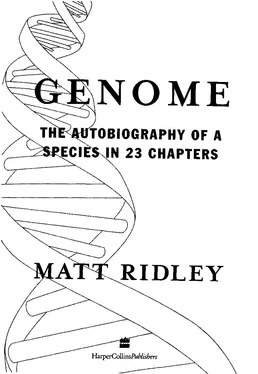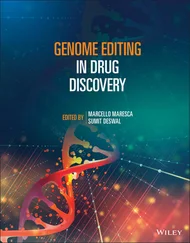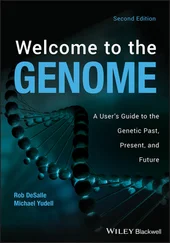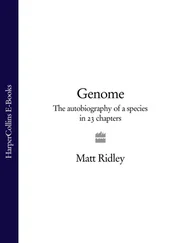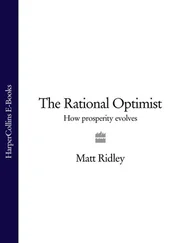Genome - Matt Ridley
Здесь есть возможность читать онлайн «Genome - Matt Ridley» — ознакомительный отрывок электронной книги совершенно бесплатно, а после прочтения отрывка купить полную версию. В некоторых случаях можно слушать аудио, скачать через торрент в формате fb2 и присутствует краткое содержание. Жанр: Старинная литература, на английском языке. Описание произведения, (предисловие) а так же отзывы посетителей доступны на портале библиотеки ЛибКат.
- Название:Matt Ridley
- Автор:
- Жанр:
- Год:неизвестен
- ISBN:нет данных
- Рейтинг книги:5 / 5. Голосов: 1
-
Избранное:Добавить в избранное
- Отзывы:
-
Ваша оценка:
- 100
- 1
- 2
- 3
- 4
- 5
Matt Ridley: краткое содержание, описание и аннотация
Предлагаем к чтению аннотацию, описание, краткое содержание или предисловие (зависит от того, что написал сам автор книги «Matt Ridley»). Если вы не нашли необходимую информацию о книге — напишите в комментариях, мы постараемся отыскать её.
Matt Ridley — читать онлайн ознакомительный отрывок
Ниже представлен текст книги, разбитый по страницам. Система сохранения места последней прочитанной страницы, позволяет с удобством читать онлайн бесплатно книгу «Matt Ridley», без необходимости каждый раз заново искать на чём Вы остановились. Поставьте закладку, и сможете в любой момент перейти на страницу, на которой закончили чтение.
Интервал:
Закладка:
By this standard, eugenics happens every day in hospitals all over the world and by far its most common victims are embryos equipped with an extra chromosome 21, who would otherwise be born with Down syndrome. In most cases, had they been born, they would have led short, but largely happy lives — that is the nature of their disposition. In most cases, had they been born, they would have been loved by parents and siblings. But for a dependent, non-sentient embryo, not being born is not necessarily the same as being killed.
We are back, in short order, to the debate on abortion and whether the mother has the right to abort a child, or the state the right to stop her: an old debate. Genetic knowledge gives her more reasons for wanting an abortion. The possibility of choosing among embryos for special ability, rather than against lack of ability, may not be too far away. Choosing boys and aborting girls is already a rampant abuse of amniocentesis in the Indian subcontinent in particular.
Have we rejected government eugenics merely to fall into the trap of allowing private eugenics? Parents may come under all sorts of pressures to adopt voluntary eugenics, from doctors, from health-insurance companies and from the culture at large. Stories abound of women as late as the 1970s being cajoled by their doctors into sterilisation because they carried a gene for a genetic disease. Yet if government were to ban genetic screening on the grounds that it might be abused, it would risk increasing the load of suffering in the world: it would be just as cruel to outlaw screening as to make it compulsory. It is an individual decision, not one that can be left to technocrats. Kitcher certainly thinks so: 'As for the traits that E U G E N I C S 2 9 9
people attempt to promote or avoid, that is surely their own business.' So does James Watson: 'These things should be kept away from people who think they know b e s t . . . I am trying to see genetic decisions put in the hand of users, which governments aren't.'12
Although there are still a few fringe scientists worried about the genetic deterioration of races and populations,13 most scientists now recognise that the well-being of individuals should take priority over that of groups. There is a world of difference between genetic screening and what the eugenists wanted in their heyday — and it lies in this: genetic screening is about giving private individuals private choices on private criteria. Eugenics was about nationalising that decision to make people breed not for themselves but for the state. It is a distinction frequently overlooked in the rush to define what 'we' must allow in the new genetic world. Who is 'we'? We as individuals, or we as the collective interest of the state or the race?
Compare two modern examples of 'eugenics' as actually practised today. In the United States, as I discussed in the chapter on chromosome 13, the Committee for the Prevention of Jewish Genetic Disease tests schoolchildren's blood and advises against later marriages in which both parties carry the same disease-causing version of a particular gene. This is an entirely voluntary policy. Although it has been criticised as eugenic, there is no coercion involved at all.14
The other example comes from China, where the government continues to sterilise and abort on eugenic grounds. Chen Mingzhang, minister of public health, recently expostulated that births of inferior quality are serious among 'the old revolutionary base, ethnic minorities, the frontier, and economically poor areas'. The Maternal and Infant Health Care Law, which came into effect only in 1994, makes premarital check-ups compulsory and gives to doctors, not parents, the decision to abort a child. Nearly ninety per cent of Chinese geneticists approve of this compared with five per cent of American geneticists; by contrast eighty-five per cent of the American geneticists think an abortion decision should be made by the woman, compared with forty-four per cent of the Chinese. As 3 0 0 G E N O M E
Xin Mao, who conducted the Chinese part of this poll, put it, echoing Karl Pearson: 'The Chinese culture is quite different, and things are focused on the good of society, not the good of the individual.'15
Many modern accounts of the history of eugenics present it as an example of the dangers of letting science, genetics especially, out of control. It is much more an example of the danger of letting government out of control.
C H R O M O S O M E 2 2
F r e e W i l l
Hume's fork: Either our actions are determined, in which case we are not responsible for them, or they are the result of random events, in which case we are not responsible for them.
Oxford Dictionary of Philosophy
As this book is being completed, a few months before the end of a millennium, there comes news of a momentous announcement. At the Sanger Centre, near Cambridge - the laboratory which leads the world in reading the human genome - the complete sequence of chromosome 22 is finished. All 15.5 million 'words' (or so - the exact length depends on the repeat sequences, which vary greatly) in the twenty-second chapter of the human autobiography have been read and written down in English letters: 47 million As, Cs, Gs and Ts.
Near the tip of the long arm of chromosome 22 there lies a massive and complicated gene, pregnant with significance, known as HFW. It has fourteen exons, which together spell out a text more than 6,000 letters long. That text is severely edited after transcription by the strange process of R N A splicing to produce a 3 0 2 G E N O M E
highly complicated protein that is expressed only in a small part of the prefrontal cortex of the brain. The function of the protein is, generalising horribly, to endow human beings with free will. Without HFW, we would have no free will.
The preceding paragraph is fictional. There is no HFW gene on chromosome 22 nor on any other. After twenty-two chapters of relentless truth, I just felt like deceiving you. I cracked under the strain of being a non-fiction writer and could no longer resist the temptation to make something up.
But who am 'I'? The I who, overcome by a silly impulse, decided to write a fictional paragraph? I am a biological creature put together by my genes. They prescribed my shape, gave me five fingers on each hand and thirty-two teeth in my mouth, laid down my capacity for language, and defined about half of my intellectual capacity.
When I remember something, it is they that do it for me, switching on the C R E B system to store the memory. They built me a brain and delegated responsibility for day-to-day duties to it. They also gave me the distinct impression that I am free to make up my own mind about how to behave. Simple introspection tells me there is nothing that I 'cannot help myself doing. There is equally nothing that says that I must do one thing and not something else. I am quite capable of jumping in my car and driving to Edinburgh right now and for no other reason than that I want to, or of making up a whole paragraph of fiction. I am a free agent, equipped with free will.
Where did this free will come from? It plainly could not have come from my genes, or else it would not be free will. The answer, according to many, is that it came from society, culture and nurture.
According to this reasoning, freedom equals the parts of our natures not determined by our genes, a sort of flower that blooms after our genes have done their tyrannical worst. We can rise above our genetic determinism and grasp that mystic flower, freedom.
There has been a long tradition among a certain kind of science writer to say that the world of biology is divided into people who believe in genetic determinism and people who believe in freedom.
Yet these same writers have rejected genetic determinism only by F R E E W I L L 3 0 3
Читать дальшеИнтервал:
Закладка:
Похожие книги на «Matt Ridley»
Представляем Вашему вниманию похожие книги на «Matt Ridley» списком для выбора. Мы отобрали схожую по названию и смыслу литературу в надежде предоставить читателям больше вариантов отыскать новые, интересные, ещё непрочитанные произведения.
Обсуждение, отзывы о книге «Matt Ridley» и просто собственные мнения читателей. Оставьте ваши комментарии, напишите, что Вы думаете о произведении, его смысле или главных героях. Укажите что конкретно понравилось, а что нет, и почему Вы так считаете.
